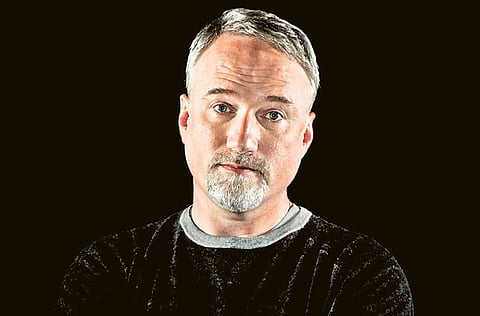Sold on a dark bond
David Fincher talks about what piqued his interest in ‘The Girl With the Dragon Tattoo'

Maybe I am too insulated," David Fincher says. "Or too confident, or simply sociopathic, but I can only do what I think is best."
Dressed in dark jeans and a black sweater, Fincher — the 49-year-old American director of Seven, Fight Club, Zodiac and The Social Network — is pacing around a room in the Dorchester Hotel. He is trying to explain why, when invited to direct a $100-million (Dh367-million) adaptation of Stieg Larsson's brutal, wildly popular crime thriller The Girl With the Dragon Tattoo — one that had already been made into a successful Swedish film — it didn't occur to him to feel anxious.
"I begin the process of making a film by asking, ‘What am I not going to worry about?'" he says. "To make it manageable, I need to not worry about how expensive it is or how it can be misconstrued. You can't take everything on."
"How do you eat a whale?" he continues, "One bite at a time. How do you shoot a 150-day film? You shoot it one day at a time."
Larsson's book — the first in his blockbusting Millennium series — sold 65 million copies. Lisbeth Salander, its extraordinary, damaged, tattooed, antisocial biker-hacker heroine, became an unlikely international icon. Her curious relationship with Mikael Blomkvist, the rumpled journalist with whom she attempts to solve a series of sexual murders, was picked over beside water-coolers in offices around the world.
Fincher, who directed his first feature, Alien 3, before he was 30, knows he has a reputation among senior Hollywood executives for being the guy who "makes films that are sort of dark, who's a little uncompromising when it comes to how stuff gets presented and who's really not afraid to offend anybody". It is not a reputation that bothers him.
Yet, when he finally read both Larsson's book and Steve Zaillian's elegantly boiled-down screenplay, it wasn't the notorious scenes of sodomy, sexual abuse and torture that most piqued his interest. What really fascinated Fincher was not "the pulp thriller side" of the book but the peculiarity of the bond between Salander and Blomkvist. "The way they fit together; the way that he hurts her; the way that she allows him to hurt her — all that stuff."
As played by the magnetic Rooney Mara in Fincher's film, Salander is the abrasive, marmoreal-skinned computer freak who will hack into people's e-mail accounts without a second thought. Blomkvist (Daniel Craig) is her opposite: the old-school hack with a face like an unmade bed and an uneasy way with technology; the kind of man who sticks Post-it Notes to his computer screen.
"I felt that Blomkvist was a classic journalist," says Fincher, shooting a vaguely apologetic look in my direction. "My father was a reporter, so I'll say this: I felt Blomkvist was a wallflower who passed judgment from a safe distance. He goes through this film, saying, ‘I've seen the reports, I've seen the case studies, I know the evil that men do.' Then he looks into the eyes of a girl half his age and she goes, ‘Dude, you have no idea.'"
Salander is fuelled by rage, Blomkvist by disappointment. The gulf between the two — physical, technological, ideological, generational — gapes so wide that when they are finally brought together, almost halfway into Fincher's bristling, tachycardiac film, the encounter registers with the force of planets colliding. "At the end of this film, I want people to say, ‘I can't wait to see those two again,'" he says.
Does that mean he already has an eye on the sequels — The Girl Who Played With Fire and The Girl Who Kicked the Hornet's Nest? "I don't know," Fincher says, flopping back into his chair, his confidence slipping for the first time. "First of all, 35 million people have to see this film," he sighs, "and that's a big number."
Sign up for the Daily Briefing
Get the latest news and updates straight to your inbox

